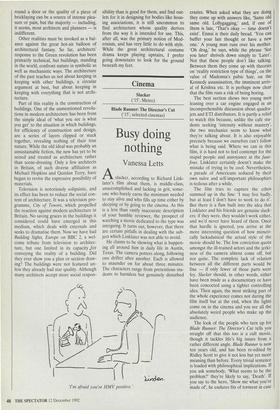Cinema
Slacker (`15', Metro) Blade Runner: The Director's Cut (`15' , selected cinemas)
Busy doing nothing
Vanessa Letts
Aslacker, according to Richard Link- later's film about them, is middle-class, unaccomplished and lacking in grit, some- one who barely earns the minimum needed to stay alive and who fills up time either by sleeping or by going to the cinema. As this is a less than vastly inaccurate description of your humble reviewer, the prospect of watching a movie dedicated to the type was intriguing. It turns out, however, that there are certain pitfalls in dealing with the sub- ject which Linklater was not able to avoid.
He claims to be showing what is happen- ing all around him in daily life in Austin, Texas. The camera potters along, following one drifter after another. Each is allowed to maunder on for about three minutes. The characters range from pretentious stu- dents to harmless but genuinely disturbed 'I'm afraid you're HMV positive.' crazies. When asked what they are doing they come up with answers like, 'Same old same old. Lollygagging,' and, if one of them is late, 'That's okay — time doesn't exist'. Ennui is their daily bread. 'You can buffer your last thought or have a new one.' A young man runs over his mother. `Oh drag,' he says, while the phrase 'See you later' shrivels down simply to 'Later'. Not that these people don't like talking. Between them they come up with theories on 'reality restriction type of things', on the value of Madonna's pubic hair, on the Kennedy assassination, the imminent arriv- al of Krishna etc. It is perhaps now clear that the film runs a risk of being boring.
The best section shows two young men leaning over a car engine engaged in an incomprehensible discussion about quadra- jets and ETI distributors. It is partly a relief to watch this because, unlike the cafe stu- dents seeking 'intensity without mastery', the two mechanics seem to know what they're talking about. It is also enjoyable precisely because we ourselves can't follow what is being said. Where we can in this film, it is hard not to feel contempt for the stupid people and annoyance at the faux- fous. Linklater certainly doesn't make the mistake of trying to be cool. Nevertheless, a parade of Americans seduced by their own naive and self-important philosophies is tedious after a while.
The film tries to capture the ethos summed up in the line: 'I may live badly, but at least I don't have to work to do it'. But there is a flaw built into the idea that Linklater and his friends are genuine slack- ers: if they were, they wouldn't work either, and we'd never have heard of them. Once that hurdle is ignored, you arrive at the more interesting question of how mimeti- cally lackadaisical the actual style of the movie should be. The low conviction quota amongst the ill-trained actors and the jerki- ness of the camera almost come off, but not quite. The complete lack of relation between all the different parts would be fine — if only fewer of those parts were fey. Slacker should, in other words, either have been made as a documentary or have been concocted using a tighter controlling idea. Then again, the most striking part of the whole experience comes not during the film itself but at the end, when the lights come on in the cinema and you see all the absolutely weird people who make up the audience.
The look of the people who turn up for Blade Runner.• The Director's Cut tells you straight off that this too is a cult movie, though it tackles life's big issues from a rather different angle. Blade Runner is now ten years old, and has been re-edited by Ridley Scott to give it not less but yet more meaning than before. Every trivial sentence is loaded with philosophical implications. If you ask somebody, 'What seems to be the problem?' they're likely to say, 'Death'. If you say to the hero, 'Show me what you're made of he endures fits of torment in case
the answer is a lot of tiny microchips and closed circuits.
Unlike Slacker, Blade Runner is wonder- fully unembarrassed by its own intellectual pretensions. Its basic story is exciting enough that you don't object to the vast issues which it raises on the way. This spell collapses the moment you step outside the cinema, but it's not hard to understand why the film continues to be a success. It is probably only worth going to, on the other hand, if you've never seen it before.



































































 Previous page
Previous page